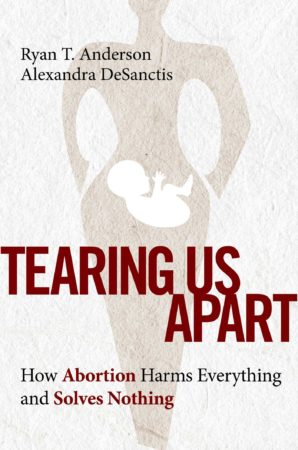Tearing Us Apart: How Abortion Harms Everything and Solves Nothing
Ryan T. Anderson and Alexandra DeSanctis
(Regnery: $38, 296 pages)
 Ryan T. Anderson and Alexandra DeSanctis have written the definitive book that works as both an extended critique of abortion and as an invaluable and insightful reference about its detrimental effects. The authors note in their introduction that “Abortion harms every single one of us by perpetuating deeply rooted falsehoods about what it means to be human.” They argue that because of a fundamentally flawed anthropology, namely that “the most distinctive characteristic of female biology – nurturing a child in the womb – is something from which women must be liberated,” abortion advocates err on the side of doing the maximum amount of damage to individuals, institutions, and ideas. The list of harmed parties include (obviously) the unborn child as well as women and the family, but also our politics and democracy, equality and choice, medicine, the rule of law, and media and culture. In explaining the attacks on these institutions and ideas, the authors effectively describe the profoundly public nature of abortion; it is no mere private choice. Abortion not only butchers a preborn child and can cause serious physical, emotional, and spiritual harm to aborting mothers, but attacks our common culture and the institutions that protect it.
Ryan T. Anderson and Alexandra DeSanctis have written the definitive book that works as both an extended critique of abortion and as an invaluable and insightful reference about its detrimental effects. The authors note in their introduction that “Abortion harms every single one of us by perpetuating deeply rooted falsehoods about what it means to be human.” They argue that because of a fundamentally flawed anthropology, namely that “the most distinctive characteristic of female biology – nurturing a child in the womb – is something from which women must be liberated,” abortion advocates err on the side of doing the maximum amount of damage to individuals, institutions, and ideas. The list of harmed parties include (obviously) the unborn child as well as women and the family, but also our politics and democracy, equality and choice, medicine, the rule of law, and media and culture. In explaining the attacks on these institutions and ideas, the authors effectively describe the profoundly public nature of abortion; it is no mere private choice. Abortion not only butchers a preborn child and can cause serious physical, emotional, and spiritual harm to aborting mothers, but attacks our common culture and the institutions that protect it.
Tearing Us Apart will help pro-lifers articulate arguments against abortion from various angles, a necessity in what can only be called a pro-abortion culture. There is detailed descriptions of the abortion procedure and arguments about the sanctity of the life of the preborn child. There is a long list of the harms done to women, showing that there are often short- and long-term deleterious effects on aborting mothers and thus proving that it is not in the woman’s health interest to procure an abortion. They rehearse the statistics about family breakdown when fathers are excluded from decisions affecting their children. These are perhaps all well-known to pro-lifers. More novel are the arguments against our (formerly) uniting ideas and institutions. They demonstrate that while abortion is defended as a necessary prerequisite for equality and personal autonomy, many women who “choose” abortion feel they have little choice in the matter and the “choice” to have an abortion becomes a duty or necessity. Abortion corrupts medicine, including amending the Hippocratic Oath, and jurisprudence, politics, media, and culture because of the degrading of societal norms against killing children. Legal abortion has meant “decades of broken hearts and broken homes, dissolution, destruction, and despair.” Anderson and DeSanctis have written an accessible and important primer on the abortion debate, and one that should open eyes to the widespread destruction abortion causes, not just inside the womb, but outside, too.




